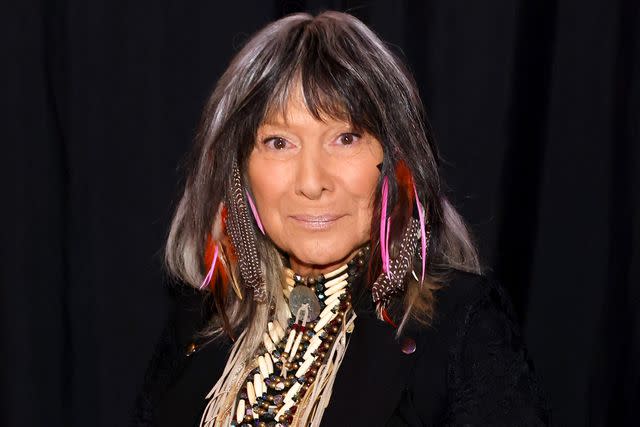Buffy Sainte-Marie says CBC investigation into ancestry includes fabrications
"I have never lied about my identity."
Singer-songwriter Buffy Sainte-Marie is pushing back against the CBC investigation that questions her Indigenous ancestry, claiming that the proof presented is rooted in fabrications.
In a lengthy statement shared Thursday, Sainte-Marie questioned the authenticity of the birth certificate presented in the episode of CBC's The Fifth Estate and claimed that the program relied on stories fabricated by her brother and abuser, Alan, and other family members she did not even know.
"This has been incredibly re-traumatizing for me and unfair to all involved," she said. "It hurts me deeply to discover that my estranged family grew up scared of me and thinking these lies because of a letter I sent intended to protect me from further abuse from my brother."
"I do not blame them," she added. "They, of course, want to believe their father. I have evidence I was sexually abused by my brother, but I can’t tolerate discomforting his children even more. I wish them only the best and hope they move forward from this and find peace, as I am trying to do."

Tommaso Boddi/Getty Images
Buffy Sainte-MarieOf her birth certificate, Sainte-Marie added, "It was common for birth certificates of Indian children to be 'created' by western governments after they were adopted or taken away from their families. So it was quite shocking to me to hear a city clerk say she had 100% confidence in its authenticity. I have never known if my birth certificate was real."
"I have used it because it was the only document I’ve had my whole life," she said.
In the episode, the CBC said it obtained a birth certificate that stated Sainte-Marie was born to parents of European ancestry in Massachusetts. The document, reportedly authenticated by Stoneham town clerk Maria Sagarino, stated a "Beverly Jean Santamaria" was born to white parents. Sainte-Marie maintained that she has "never lied about my identity."
"What I know about my Indigenous ancestry I learned from my growing up mother, who was of Mi’kmaq heritage, and my own research later in life," she said, adding that she was later adopted by a Cree family Emile Piapot and Clara Starblanket Piapot, "in accordance with Cree law and customs."
"My Indigenous identity is rooted in a deep connection to a community which has had a profound role in shaping my life and my work," she said. "For my entire life, I have championed Indigenous, and Native American causes when nobody else would, or had the platform to do so. I am proud to have been able to travel the world, sharing Indigenous stories."
Sainte-Marie, who has been hailed as the first Indigenous person to win an Oscar for co-writing "Up Where We Belong" from 1982's An Officer and a Gentleman, previously denounced the CBC program on social media.
Related content:
Sacheen Littlefeather, Native American activist who protested the Oscars, was a 'fraud,' sisters say
Read the original article on Entertainment Weekly.
